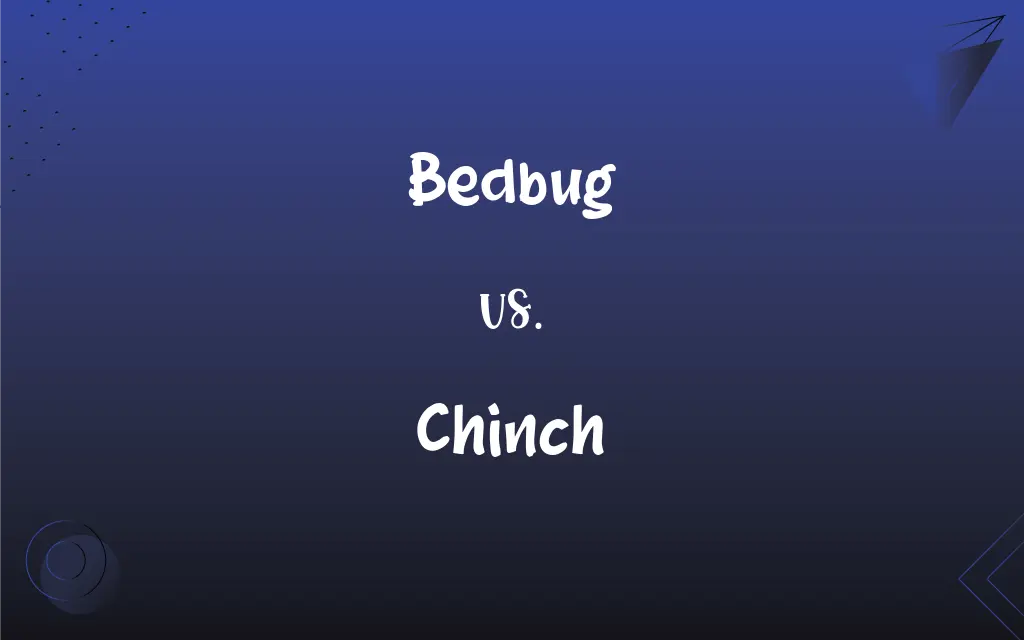Bedbug vs. Chinch: What's the Difference?
Edited by Aimie Carlson || By Janet White || Updated on October 12, 2023
A bedbug is a small, blood-sucking insect that infests beds and other furniture, while "chinch" is another term for bedbug, particularly in older literature or colloquially.

Key Differences
A bedbug is a notorious insect, known scientifically as Cimex lectularius, that feeds on the blood of humans and animals. These pests are typically reddish-brown, flat, and small. Their bites can cause itchiness, rashes, and allergic reactions. Chinch, on the other hand, is a term that has been used in the past, especially in older literature, to refer to the same insect. While "bedbug" is the more universally recognized term today, "chinch" is a historical or colloquial name for the same pest.
Both bedbug and chinch are terms that elicit a sense of discomfort and unease, especially for those who've experienced infestations. Bedbugs, irrespective of the name used, have the potential to proliferate quickly and are notoriously difficult to eradicate. The terms may differ, but the characteristics and challenges associated with the insect remain consistent whether you call it a bedbug or a chinch.
Historically, the use of the term "chinch" to describe these insects traces back to older English and even other languages. It's worth noting, however, that in modern times, especially in American English, "bedbug" is the more widely accepted and understood term. Despite the nomenclature, the experience of an infestation is universally unpleasant.
In literature and day-to-day conversations, when the term bedbug is mentioned, the immediate understanding is of a parasitic insect associated with sleeping areas. The term chinch, however, may require clarification in many contexts due to its lesser-known usage. Therefore, it's beneficial to be familiar with both terms, particularly when delving into older texts or interacting in diverse linguistic environments.
Comparison Chart
Definition
A small, blood-feeding insect
Another term for a bedbug
ADVERTISEMENT
Common Usage
Widely recognized in modern English
More commonly found in older literature
Associated Effects
Itchy bites, potential allergic reactions
Same as bedbug
Eradication
Notoriously difficult to get rid of
Same challenges as bedbug
Historical Context
Has always been a term to describe this pest
An older term with similar meaning
Bedbug and Chinch Definitions
Bedbug
A parasitic insect that feeds on blood.
The hotel had a bedbug infestation that they were trying to control.
ADVERTISEMENT
Chinch
See bedbug.
Bedbug
A nocturnal insect that typically feeds on sleeping hosts.
The bedbug is most active during the night.
Chinch
The bedbug (Cimex lectularius).
Bedbug
A pest that can spread rapidly if not controlled.
Bedbug infestations can get out of hand without prompt treatment.
Chinch
The bedbug (Cimex lectularius).
Bedbug
An insect known to cause skin rashes upon biting.
He had to consult a dermatologist after a bedbug bite.
Chinch
A bug (Blissus leucopterus), which, in the United States, is very destructive to grass, wheat, and other grains; - also called chiniz, chinch bug, chink bug. It resembles the bedbug in its disgusting odor.
Bedbug
A small, reddish-brown bug found in bedding.
She woke up with itchy bites and suspected bedbug presence.
Chinch
Bug of temperate regions that infests especially beds and feeds on human blood
Bedbug
Any of several small wingless parasitic insects of the family Cimicidae, especially Cimex lectularius, which infests dwellings and bedding and feeds on human blood. Also called regionally chinch.
Bedbug
A small nocturnal insect (Cimex lectularius), of the family Cimicidae, that feeds on the blood of humans and other warm-blooded hosts.
Bedbug
A wingless, bloodsucking, hemipterous insect (Cimex Lectularius), sometimes infesting houses and especially beds. See Illustration in Appendix.
Bedbug
Bug of temperate regions that infests especially beds and feeds on human blood
FAQs
Where do bedbugs commonly hide?
They usually hide in cracks and crevices, especially in bed frames, mattresses, and box springs.
What is a bedbug?
A bedbug is a small, flat, reddish-brown insect that feeds on the blood of humans and animals, primarily at night.
How can I identify bedbug bites?
Bedbug bites are often in a line or cluster, and can become red, swollen, and itchy.
How are bedbugs transmitted?
They are often spread through travel, hitching rides on luggage, furniture, or clothing.
Do bedbugs spread diseases?
While bedbugs are not known to transmit diseases to humans, their bites can cause itching and allergic reactions.
How can I get rid of bedbugs?
Professional pest control is often recommended, along with washing and heat-treating affected belongings.
Are bedbugs a sign of poor hygiene?
No. Bedbugs can infest even the cleanest of environments. Their presence is not related to cleanliness.
Do bedbugs fly?
No. Bedbugs do not have wings and cannot fly.
Where are chinch bugs commonly found?
They are typically found in lawns, especially those with stressed or drought-stricken grass.
Are bedbugs only found in beds?
No. While they prefer beds, they can be found in sofas, luggage, and other places.
What is a chinch?
A chinch, often referred to as a "chinch bug," is a small insect known to damage lawns by feeding on the sap of grasses.
How can I identify chinch bug damage?
Affected areas of the lawn often turn yellow, then brown, and appear as if they are drought-stricken.
How can I prevent a bedbug infestation?
Regularly inspect sleeping areas, avoid bringing second-hand furniture home without inspecting it, and be cautious in hotels and public transport.
How can I control chinch bugs in my lawn?
Regular watering, maintaining healthy grass, and using insecticides specifically for chinch bugs can help.
Are chinch bugs seasonal?
Yes, they are typically more active during warm weather, especially in the summer.
Are chinch bugs visible to the naked eye?
Yes, but they are small. Adult chinch bugs are about 1/5 inch long with black bodies and white wings.
Do chinch bugs bite humans?
No, chinch bugs feed on grass sap and do not bite humans.
Is "chinch" related to "bedbug"?
While both are bugs, they are different species with different habits and habitats.
About Author
Written by
Janet WhiteJanet White has been an esteemed writer and blogger for Difference Wiki. Holding a Master's degree in Science and Medical Journalism from the prestigious Boston University, she has consistently demonstrated her expertise and passion for her field. When she's not immersed in her work, Janet relishes her time exercising, delving into a good book, and cherishing moments with friends and family.
Edited by
Aimie CarlsonAimie Carlson, holding a master's degree in English literature, is a fervent English language enthusiast. She lends her writing talents to Difference Wiki, a prominent website that specializes in comparisons, offering readers insightful analyses that both captivate and inform.































































